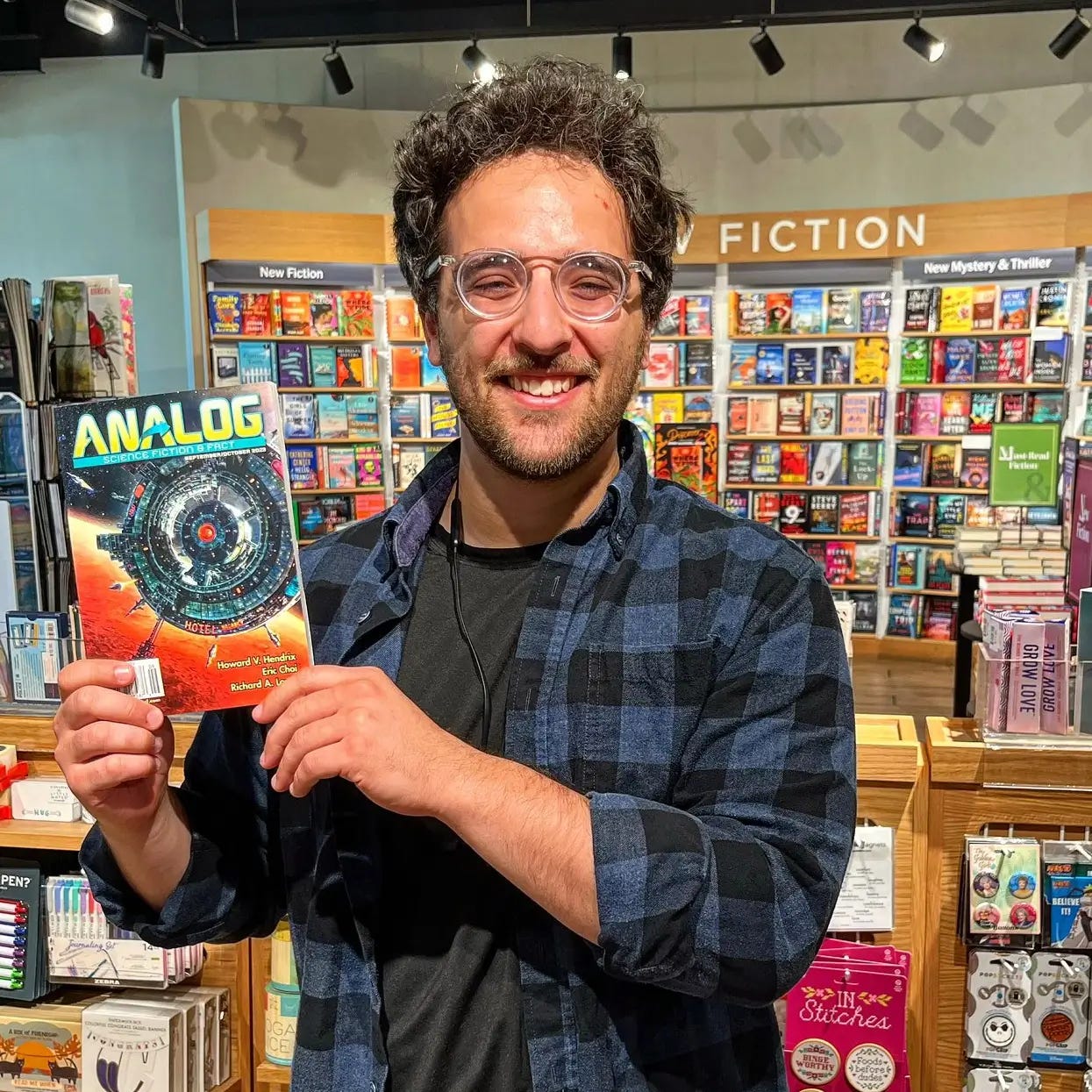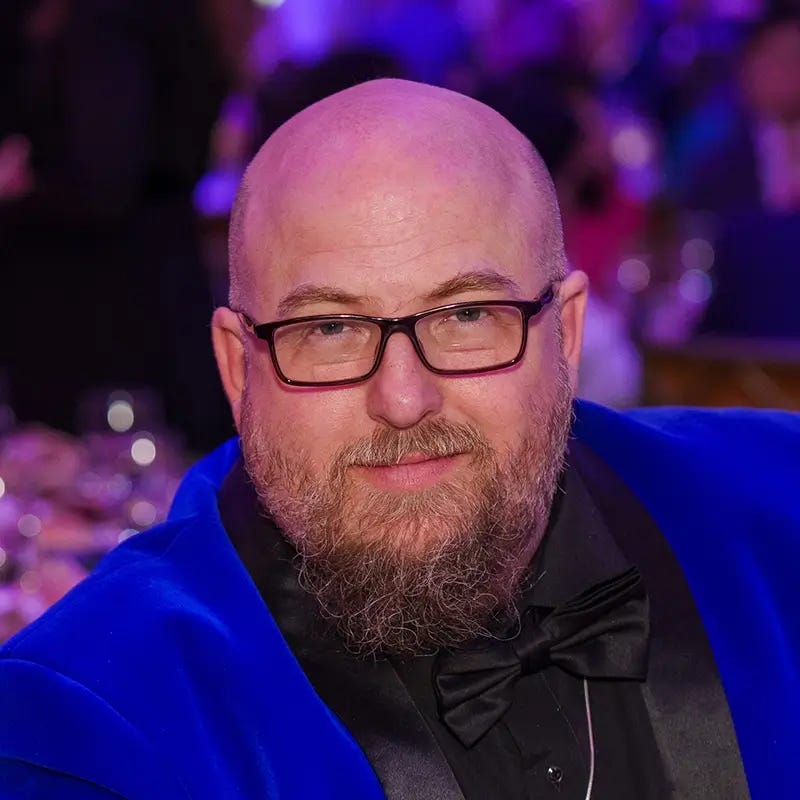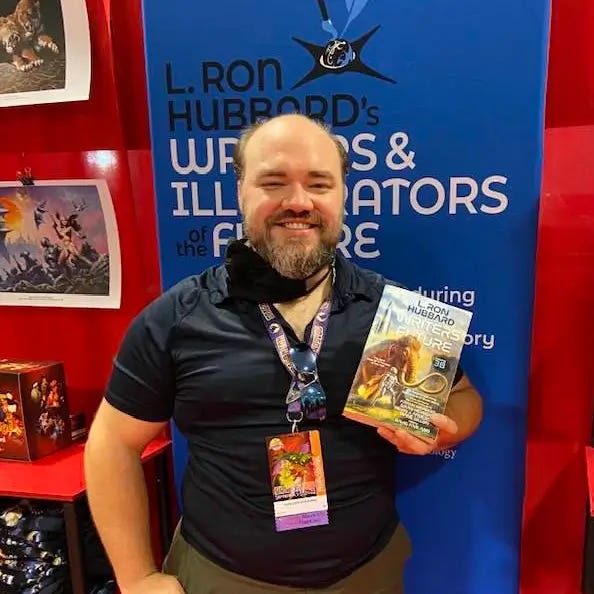
How do you win the Writers of the Future Contest? Reading the following advice from 36 contest winners might help, but it’s up to you to put their wisdom into practice.
I reached out to many wonderful and supportive authors for this project. After a couple hundred emails and messages, this post contains a whopping sixteen thousand words of advice. My only hope is that the writing community appreciates it.
The best advice I learned through this endeavor is the importance of networking; writers communicating with and supporting each other.
Thank you to all the authors who made this article possible, especially for their patience with my editing and proofs. Special thanks go to Brittany Rainsdon. Brittany gave me the inspiration for this project when she answered my first query in June, 2022. Connecting with her gave me the impetus to connect with other writers for this project. Finally, thank you, Alex Fox, a fellow contest entrant who didn’t flinch away from some random newbie asking her for a critique.
Some of the contributors may seem like they’re echoing each other, but I think this repetition reinforces the message to new and aspiring writers while also highlighting its importance.
Related posts
Table of Contents
Desmond Astaire
Website | Twitter | WotF Blog Article | MURDERBIRDS Kickstarter
2022; Vol. 38; Fourth Quarter, First Place, & Golden Pen Award Winner; “Gallows.”
The Writers of the Future Contest is an extraordinary, competitive professional and skill advancement opportunity. With it being free and supported by so many industry professionals, there’s nothing else like it. So, how do you land it? I believe there is some strategy that can help.
Get a copy editor
You need someone who can see and fix the typos and grammatical errors you will inevitably miss because you’ve re-read your story 105 times, whether it’s a reputable paid service or a friend or colleague you trust. The late David Farland, Volume 38’s coordinating judge and editor, recommended using a copy editor as a surefire way to stand out because, in a merit-based competition, your errors will do the opposite.
Be different
One reason my Volume 38 story intrigued the judges is that it differed from what they usually receive. In my opinion, all the winners, finalists, semi-finalists, and silver honorable mentions are talented writers. But there can only be 11 winners, maybe a published finalist or two, and one Golden Pen winner, so you must stand out among your peers. At this time, the Contest receives more fantasy entries than sci-fi entries. When the Marvel Cinematic Universe took off, they got an influx of superhero-based stories. Analyze the market and determine where you have an opportunity to be unique. Submit often and with a variety of stories.
Enroll in the Writers of the Future Online Workshop
If you don’t, you’re not taking this opportunity seriously enough. This workshop is free, self-paced, and offers next-level training from household names of speculative fiction. Any other organization would charge thousands of dollars for the content you’ll receive. But, as per the will of founder L. Ron Hubbard, Writers of the Future is about enabling new talent and the future of speculative fiction, so it’s no cost, no strings attached. Taking this workshop made the difference from me landing some semi-finalist and below placements to then hitting first place and the Golden Pen Award.
Zack Be
Website | Twitter | Facebook | Instagram | Bandcamp | Youtube | WotF Podcast
2020; Vol. 36; Second Quarter, Second Place Winner; “As Able the Air.”
Ask yourself: why am I submitting to WotF?
The first and most important question to answer is this: why am I submitting to WotF? Another way of asking this question is: What does WotF mean to me?
WotF meant this to me when submitting: It’s a pro-market, like many others. Clarkesworld, Asimov’s/Analog, Uncanny, WotF, etc., and so forth—they’re all venues where you can submit stories and, if selected out of the slush, get a paycheck and get published, building your resume in the process.
Other markets have unique benefits as well.
Clarkesworld is free to read and generates a podcast of your work, so the number of people you can reach is hypothetically maximized.
Asimov’s puts you in print and on bookstore shelves, with a circulation of about 23k, which brings you many new readers and raises your profile.
Uncanny is highly regarded and widely read by Hugo voters, meaning your chances of getting noticed by a vital audience within the SFF community are increased.
And WotF? WotF gets you in physical print with an excellent payout and a lovely trip to LA for a workshop and ego-boosting awards ceremony.
The biggest mistake: placing WotF on a pedestal when you can pro-out
The biggest mistake I see writers make is placing WotF on a unique pedestal separate from the others, hamstringing their development in the process. Write and submit, write and submit… if you happen to sell two pro stories before you win WotF … GOOD FOR YOU! Brandon Sanderson never won WotF, and look at him now.
There are two less-than-ideal answers to Why am I submitting to WotF?
I tend to find that the writers who hamstring their development answer that first question—why am I submitting to WotF?—in one of two less-than-ideal ways.
The first less-than-ideal answer: “I want to win WotF for the glory and the riches, to validate that I am indeed the amazing SFF writer I imagine myself to be.”
As is often the case, those who create art in search of glory, recognition, or riches tend to make art that is not very good. If there is a part of you pursuing WotF for that reason, I invite you to take a step back and ask yourself why you write—or why you started writing—at all. If glory, recognition, or riches are your underlying motivations for writing, I might suggest military, politics, or finance as better markets to spend your limited daily potential.
Far too many authors come to posts like this one seeking an angle, a formula, or some secret knowledge that will allow them to win a prize that boosts their ego, missing along the way that the best stories are the ones we write because we want to—or have to—write them.
The chances of being published in any of the above pro-markets are incredibly slim—in most cases, we are talking about less (or WAY less) than 2% of submissions getting published—and therefore, while the glory of getting pro-published feels excellent, the real motivation underneath must be that you love writing stories, and even more importantly, that you are writing stories you love.
WotF winners write because they have to write and tell stories that are authentic to their interests and perspective. Every professional editor I’ve had the privilege of working with (some of whom are the editors of those major markets mentioned above) has said the same thing to me - the stories that stick aren’t the ones trying to follow a formula, but are instead those that bring forth the idiosyncratic voice of the author.
Suppose you stop focusing on the glory of winning WotF and focus instead on continually producing work that you love. In that case, your chances of being published in WotF or any other markets I talked about will increase tremendously.
I won’t lie to you. It’s possible that your interests and perspectives won’t match with the editor of the market that you are submitting to, and that’s OK. That might even mean WotF is not a market you can be published in... AND THAT’S OK.
You’ll still develop much more quickly as an author if you write what you want to write and focus less on trying to determine the future interests of editors and judges via mind reading or magical thinking. If you pursue this path, you will write better fiction, and the right editor will pick it out of the slush. You’ll get a paycheck, a resume boost, and some idiosyncratic market benefits, and then you’ll move on to the next story because there is nothing else you’d rather do. If there is something else, then do that.
The second less-than-ideal answer: “I need to win WotF to start my career.”
This is the ultimate form of hamstringing—as I said above, the likelihood of being published in a pro-market is always slim, and those who see WotF as the step they need to take before submitting to the Asimov’s and Clarkesworlds of the world are limiting themselves unnecessarily. I’d again ask you to take a step back and soak in the breadth of opportunities to write and be read that surround you.
My advice
Find a writing group if that suits you (perhaps even through the WotF Forum; personally, I didn’t do this).
Resist the urge to write to a specific market unless you’ve been specifically asked (e.g., on spec) or challenged to do so (e.g., themed call-for-submissions, writing group challenges).
Always be writing, submitting, and challenging yourself to take advantage of open markets. Take breaks if you need them to recharge.
One of the great things about WotF is that it is open four times a year, so submit four times a year.
Essentially, Clarkesworld and Asimov’s never close, so submit as often as possible.
Keep track of other pro markets and submit when you can. Again, your breakthrough might not be through WotF, and that’s OK. To go back to the original point, it’s just one market. You don’t need WotF, but you can use WotF to push yourself as a writer.
Lazarus Black
Website | Twitter | Facebook | Instagram | Amazon | WotF Blog Article | Writing Effective Visuals
2022; Vol. 38; Third Quarter, First Place Winner; “Psychic Poker.”
Follow Your Heart but Lead With Your Mind
IMHO, the greatest tool a writer or any creative can have is “self-awareness”
What kind of writer are you? What motivates you? What percolates inside you? What gets put on the page versus what do you WANT to put on the page? And why, why, why, and why?
Craft vs. creativity
I’ve been a professional creative for over 30 years. I’m just new to writing. The reality few writers talk about is that creativity is a separate skill entirely from craft. Both are complex tapestries of influences and expressions that, when working together in harmony, produce art. And every individual has different influences and expressions, and even abilities in each.
So what kind of writer are you? Are you a free-form explorer of ideas or a meticulous crafter of form and prose? Really, you will have to be both to succeed, but every writer leans one way or the other, especially when learning.
What motivates you?
What motivates you to write? Motivation is a need for the art to escape your soul. Do you need to share? Do you need to teach? Do you need to escape the world you currently live in? Do you need to feed your children?
What percolates inside you? What are the concepts, characters, and tropes that sustain you? What are the unifying features of the stories only you can tell?
Objective appraisal
What does your prose look like, objectively, versus what you WANT to put on the page? Are your words in the correct order? Your sentences? Your paragraphs? Your ideas? Your cycles of foreshadowing and closure? Your character arcs of growth and descent? And if you can’t see it objectively—and frankly, if you are still learning, you can’t—you need people you trust to tell you, and you need to listen when they say there is room for improvement and learn how to address them (even if it’s simply nodding and smiling and going your own way).
The market
Having said all of that, publishers are looking for specific qualities in stories that include technical crafting but most often hinge on very personal illusory criteria of “what they can sell” to their readers.
Writers of the Future Contest is different because it’s not just a publication—but also a legacy launching pad for all speculative writers. They want the best story—combining both creativity and craft because L. Ron Hubbard wanted to begin the careers of great new writers in every genre. And they aren’t looking for the single best “sci-fi” and the single best “fantasy” either. Sometimes, there are more winners in one genre than another, and that’s solely because of the quality of the stories.
Synthesize your craft and creativity
To win, you need to put your best forward, combining creativity and craft in the most perfect synthesis that you can. So, figure out who you are as a writer and what holes you have in your skillset that you need to improve, and work on getting better.
Success starts from somewhere, and that somewhere is inside you
I spent most of my life learning character, drama, emotion, pacing, and cycles of foreshadowing. 4 years ago, I sat down to teach myself prose—nose to the grindstone—growling in pain. 3 years in, I won Writers of the Future Contest. I have another short coming out in 2023. I am finishing a novel right now.
Success starts from somewhere, and that somewhere is inside you.
Devon V. Bohm
Website | Facebook | Instagram | Instagram #2 | TikTok | Amazon | Career Highlights
2022; Vol. 39; Second Quarter, First Place Winner; “Kitsune.”
Advice is always generic, but the writing can’t be
The funny thing to me about writing is that the advice is always generic—but the writing can’t be. In my opinion, the biggest mistake new writers make is to think that the more universal they make the characters, themes, moralistic leanings, etc., the more appeal they think it will have to a general audience. But the opposite will always be true.
The magic of reading comes from the transformative power of specificity
The magic of reading (and speculative fiction does this to an extreme—in my opinion, it’s why it appeals to so many) comes from the transformative power of specificity. Unique details are what make the world on the page become real to the reader. It sounds so simple, but the choice of detail makes the difference—what can be assumed, and what needs to be said to make this story a unique and thus enlightening experience? A new perspective can only emerge if the writer presents something new to the reader.
That being said, it’s also paramount to remember perhaps the most disheartening thing every writer knows to be true: every story has already been told. The details are dressing the seven or so stories up in different garb—and that’s okay! Why? Because there is only one you. Your word choice, details, and mind—what your stories bring to the table—should always be as much of you as you can give. That’s the place where specificity lives, the place where the magic is. You are enough.
An incredible resource
Writers of the Future Contest is an incredible resource—the workshop, the blog, the forum, et al. They’ve created a place that supports budding writers of a genre I believe is of particular importance in this day and age more than ever. Speculative fiction remains the most open and expansive version of fiction—rather than the mirror of general fiction. It uses a wide variety of funhouse mirrors to show us a world that, while distorted, is emphasized in new ways that allow us to see far more than the expected reflection would allow. Use that aspect. Speculative fiction can be many things—entertaining, surprising, funny, dark—but it is, above all, a genre that exists in service to the writer and, hopefully, if all goes well, the reader.
The real goal will always be creating art
Reading the anthology—learning about the specific market you’re selling to—is fine. But, in my opinion, it shouldn’t be the goal. The goal is the work, and where to sell it should come afterward. The most important writing advice anyone has ever given (in my opinion) is the oft-quoted Toni Morrison adage: “If there’s a book that you want to read, but it hasn’t been written yet, then you must write it.” Write the story. Then write another, and another, and another. Have your writing and non-writing friends give opinions and advice (both are equally important and will zero in on different aspects of the work), and use your instincts to sort through it. Create something you’re at least comfortable living in the world as a separate part of you (no use in waiting until you’re completely happy with something—it won’t happen, and if it does, maybe take another look) and THEN find the best place to submit it. Because the goal of a writer is never really going to be to win a contest or make money. Writers are artists; the real goal will always be creating true art.
Trust yourself enough to keep going, even when it’s hard
Lastly: keep going. Keep trying. My story received an honorable mention a year ago. I worked on it. It won. Sometimes it’s the wrong publication; sometimes, the story still needs work; sometimes, it’s just the wrong timing. Trust yourself. Trust yourself enough to keep going, even when it’s hard. If you had the impulse to write in the first place, you deserve to honor that instinct, and trust me, it will never go away.
Z. T. Bright
Website | Twitter | Facebook | Amazon | WotF Podcast | Shortwave Publishing
2022; Vol. 38; Fourth Quarter, Second Place Winner; “The Magic Book of Accidental City Destruction: A Book Wizard’s Guide.”
The Writers of the Future Contest made me a writer
I wanted to be a writer before I knew of the contest. I was writing before I knew of the contest. I was submitting before I knew of the contest. But it wasn’t until I discovered the contest that I feel like I really BECAME a writer.
What struck me about the contest from the beginning was that it seemed both illustrious and attainable at the same time. Was I capable of winning my first several times entering the contest? No. But, the contest made me feel that it wasn’t a matter of IF I would win, but WHEN I would win. I truly believed that, and I believe that of every writer entering the contest. If they want it, it’s just a matter of how long they keep at it, and the effort they’re willing to put in to improve.
My writing metronome
With its regular quarterly schedule and some idea of placement (honorable mentions/silver honorable mentions/semi-finalists/finalists), along with the fact that it was for newer writers—and therefore a (more) level playing field—the contest became my writing metronome through the year. I was always working on my next story, regardless of my results.
Did WotF help my career? Do I recommend it for new writers?
So that was a long way of answering the question of whether WotF helped my career, and whether I’d recommend it. In short, yes!
Find your blind spots
In terms of advice on winning, I’d say this: find your blind spots. I believe Dave Farland had talked a lot about this over the years, but the idea is that every writer is good at some things and bad at others. But once you know what you’re bad at—your blind spot—it’s fixable.
For example, one of my blind spots was telling fun, well-written, well plotted stories that just didn’t SAY anything. They didn’t make the reader FEEL anything. I learned how to focus more on my characters and show what they were passionate about, and how they grew throughout a story. In doing so, I made the reader feel things, due to the deeper storytelling.
It’s not enough to tell a fun story.
If your character has desires that a reader can empathize with, and goes through a painful process to achieve that thing, and grows by the end of the story to realize what they NEED is different from what they WANT, then your reader will have experienced something more than “fun.”
Eneasz Brodski
Website | Blog | Twitter | Facebook | Amazon | What Lies Dreaming | Podcast | Bio | Bio #2
2018; Vol. 34; Second Quarter, Third Place Winner; “Flee, My Pretty One.”
Everyone will tell you to join a critique group; this is good and true. But if at all possible, join an, in real life (IRL), critique group. One that meets face-to-face for critiques. Online critique groups will help you get better fast, yes. In comparison, IRL critique groups are absolute jet fuel for getting better faster. Communication bandwidth is MUCH higher in person. And you can get immediate feedback on follow-up questions you may have. AND you get to hear critiques of other people’s works, which is just as useful. Take notes on all of it, not just critiques of your stuff! The amount of progress you will make in one year is astounding.
Don’t be a coward. Or perhaps less controversially—be brave. Write about what really inspires or inflames you. Don’t censor yourself. Real passion comes through. Be scared of offending others or embarrassing yourself, but do it anyway. Your audience will notice if you’re regurgitating the same stuff everyone else is. Corporate mega-properties can afford to be bland crowd-pleasers. Unknown authors trying to get noticed will wither and die if they don’t take risks. Don’t worry about the Scientologists being super conservative—the contest is judged by outsiders, legit authors with taste and a well-trained eye. They will spotlight good writing regardless of the subjects it tackles. My winning story had anarchist revolutionaries/terrorists (depending on your POV) and kinky sex. Never write for any audience aside from the people you want to let into your soul. Then write to them without any guardrails.
Carrie Callahan
Website | Twitter | Facebook | Instagram | Amazon | WotF Blog Article | WotF Blog Article #2 | WotF Podcast
2019; Vol. 35; Second Quarter, Third Place Winner; “Dirt Road Magic.”
How the Contest helped my career
“The story I wrote for WotF, “Dirt Road Magic,” turned into a collection of short stories that was my MFA thesis. It was one of those stories that won the 2021 BGWS Emerging Writer Awards from Eastern Kentucky University. I also took the general idea of Dirt Spec behind my WotF story (which is speculative fiction about those of the underclasses, like the ex-con living out in the Kuiper belt or the aging waitress who makes ends meet by selling potions on the side) and spun it into the story titled “The Zombie in the Yard,” that won me the 2020 Working Class Writers Grant from the Speculative Literature Foundation. Through WotF, I met the people who continue to help me grow as a writer even today, so I would say it definitely helped my career.”
John M. Campbell
Website | Facebook | Amazon
2021; Vol. 37; Fourth Quarter, First Place Winner; “The Tiger and the Waif.”
To succeed at writing fiction, you need to learn the craft.
Join a critique group and read craft books
I joined the critique group offered by the Rocky Mountain Fiction Writers. There, I could share my stories with other authors and get feedback that would help me improve. Some of that feedback included recommendations of books on the craft of fiction writing. I gained a whole new understanding of the techniques writers used to make their stories compelling to the reader.
Science fiction and exciting ideas
I write stories based on interesting ideas. Growing up, I loved reading science fiction with ideas that postulated something in the future or on another planet and showed us how the idea would come into play for the hero of the story. I loved science, as it explained how the universe works in strange and mysterious ways.
Writers of the Future Online Workshop
The first two stories I submitted to the Writers of the Future Contest were rejected, but I kept learning about the craft. Then I came across the free Online Workshop on the Writers of the Future website. That workshop showed me how all the writing techniques I was learning about meshed together to create a compelling story.
Winning the Contest provides a sense of affirmation
I submitted my third entry to the Writers of the Future Contest a year after my first. I had my critique group review this story, and their suggestions really helped me polish it. A few months later, Joni Labaqui called me to tell me my story was a finalist for the quarter. Then a few weeks later, she called to say it won first place. It was a tremendous affirmation that I was beginning to master the techniques I was learning.
Learn the craft, but always look to improve
In October 2021, I attended the joint writer’s workshop and gala for Volumes 36 and 37 after the regular gala event had to be canceled for Covid. The discussions and exercises we had during that week showed that each of us winning authors had invested the time and effort to learn our craft (but always looked to improve). I think that is a significant step writers must take to break into the winning column; learn the craft but always look to improve. The Writers of the Future website has many resources to share, including the online workshop.
Excellent stories will not always win, but don’t give up
The judges have their own tastes and preferences that your story may not fit. But if you know it is a good story, don’t give up. Send it to the professional markets. In fact, my story was rejected by five professional markets before it won the Writers of the Future Contest. David Farland, the editor of the Writer’s of the Future anthology before his unfortunate death, mentioned that the year my story won, he was looking for more upbeat stories after a year of pandemic. My story just happened to fit that criterion, so maybe it got enough of a boost to make it a finalist that year. I just felt like it was a good story, in spite of the rejections. And I trusted my judgment on the matter because I had spent the time learning the craft.
Elizabeth Chatsworth
Website | Twitter | Facebook | WotF Blog Article | Amazon | The Brass Queen | Bio, Awards, & Publications | Newsletter
2021; Vol. 37; Second Quarter, Third Place Winner; “The Widow’s Might.”
For me, the most important benefit of entering the Writers of the Future (WotF) Contest is the impetus to keep creating new stories.
Remember, no one in this world can write the story that you can!
Bring your own hopes, fears, imagination, and creativity to every page.
Write from your heart and draw the reader into a unique world that delights, intrigues, or alarms you.
Describe your characters and their problems with precise, vivid language and imagery.
Add humor, if appropriate, and start your story with your main character facing a problem.
By the end of the story, your character will either solve or fail to solve the initial problem, and could potentially face new challenges. The key is that the character and their world will have changed in some way, and it’s this process of change that draws a reader in and makes your story a page-turner.
Add in a few surprises and humor if appropriate, and leave your reader with a desire to read more stories set in your world.
And then, write a new story!
Whether you receive an honorable mention or become a finalist in the WotF Contest pales beside the fact that you have become a creative force. You may see your work printed in the WotF anthology, or it may find a home elsewhere. But by taking the time and effort to create art, you’re already a winner!
David Cleden
Website | Twitter | Facebook | Amazon
2019; Vol. 35; Second Quarter, First Place Winner; “Dark Equations of the Heart.”
Join the WotF Forum
The WotF forum is a very supportive environment, and it’s valuable to share experiences among writers and motivate each other. I can attest to the all-around awesomeness that is Wulf Moon, having spent a week in his company a few years back. Paying attention to his writing advice is a brilliant thing to do!
Submit every quarter
For me, one of the most significant benefits of the WotF contest was the quarterly ticking clock. I couldn’t bear the idea of missing a quarterly submission to the competition. Hence, the next deadline was always in the back of my mind, which drove me on and forced me to produce material when I might have let things slide. Good discipline is a vital writing skill.
The porpoise approach
Not to undermine the point about surrounding oneself with good people—preferably at different stages in their writing careers because each has something different to teach you—I think there can also be times when it’s okay to pull the shutters down and focus on your writing. Following many other writers on social media is often inspirational. Still, I can drown in the writing-related feeds. It’s good to celebrate the success of other writers, but when you’re struggling to make progress yourself, the relentless good news contrasting with one’s endless stream of rejections can be crushing.
It feeds a downward spiral of doubt and undermines confidence. Sometimes (perhaps always), you have to write for yourself: get pleasure and fulfillment from the process, and tell yourself that even if no other person in the world will ever see or appreciate your work, it has still been worth it. Call it the porpoise approach. Sometimes you must dive deep into the ocean and swim alone in the dark. Then when you surface, the air tastes all the sweeter.
What works for one writer won’t automatically work for another
The very best writing advice: Don’t place your automatic trust in any piece of writing advice. Everyone’s different. Listen critically to all advice. If it feels right or sounds interesting, consider it seriously, but remember that what works for one writer won’t automatically work for another. Choose wisely!
Preston E. Dennett
Website | Twitter | Facebook | YouTube | WotF Blog Article | Podcast | Bio & Awards
2019; Vol. 35; First Quarter, Second Place Winner; “A Certain Slant of Light.”
How to Win the Writers of the Future Contest
“Our judges often pick the lighter tales as winners…Write an excellent story… We’re looking for stories that stand out…we seldom get as much humor as we’d like, and we don’t get many stories with upbeat endings…We also don’t get as much high fantasy as we’d like.”—Dave Wolverton
I entered forty-seven times before I won. Come hell or high water; I was going to win the contest. I knew I was going to win it. The question was when. I knew what it took to win for a long time, but I couldn’t pull it off. While there may be other writers and readers out there who know more about the contest and the WotF books than I do, there aren’t many.
I studied each volume in detail. Was it first person or third? How long was it? What was its theme, its genre? Why did this one win first place and another second?
I’ve been a member of the WotF forum since 2010.
I’ve read every volume multiple times. Some of the stories I’ve read probably ten or twenty times.
For me, winning was a pivotal moment in my career. To say that it helped propel it forward would be an understatement. Now that I’ve won, I feel like I am now qualified to give some advice.
Six things you can do to dramatically increase your chances of winning:
ONE: SUBMIT
It’s the number one rule. You can’t win if you don’t submit. How serious are you about winning? You must submit every quarter, with no exceptions, period. I don’t care how horrible you think your story is, your lack of confidence, or the type of story it is, enter! Please, don’t self-reject. That’s the editor’s job. Write, complete, submit, and repeat. Heinlein revealed this secret long ago. And he is one of the most successful SF writers ever.
TWO: KNOW YOUR MARKET
The WotF books will tell you all you need to know about how to win the contest. As a loser, I’d receive my rejection and wonder, why didn’t it win? All the time, the answer was right in front of me. Read the books.
Like every market, the WotF has filled a niche. It’s not only a market for amateur writers. The anthologies have a unique, delicious flavor that’s different from Analog, Asimov’s, F&SF, and the other markets. The WotF volumes contain winning stories that are quirkier and unique, a bit more inventive and fresh. If you want to win, read the books. It’s that simple.
Each book also contains writing essays by the contest judges themselves. These nuggets of wisdom on how to win are there in black and white…what are you waiting for? Read the essays by Karen Joy Fowler, Octavia Butler, Jack Williamson, Roger Zelazny, and many other greats in the field. I love just going through the books and reading these essays. The essays and the stories tell you all you need to know to win.
Please, read the contest rules. Remove the name from the manuscript. Follow the correct format. Submit speculative fiction only. Don’t go over the word limit. Simple stuff, but they rejected stories each quarter for these reasons. Also, revealing a speculative element as early as possible in the story is a good idea.
THREE: STUDY THE WOTF STORIES
I studied all the stories and came up with a list of eight things they have in common
Inventive, unique, creative trope. This is the most important. Remember, the contest receives several thousand entries per quarter. It would be best if you did everything possible to stand out from the crowd. The judges have said that a poorly executed story with a unique idea will fare better than a well-executed story with a cliché over-used trope.
Polished prose. Know your tools. Have proper grammar. Hunt out those pesky typos.
Well-structured plot. Make sure something happens. Readers want suspense, try/fail structures, and movement.
Strong hook. A hook starts with your title, then the first paragraph, then the next. Immediately introduce conflict, character & setting. Look up “en media res.” Your story must start with the action. Make your story interesting!
A satisfying ending. Tie up those loose ends. Make sure the character has a revelation in the end or changes and grows in some way.
Vivid and interesting setting. The WotF stories have some of the most marvelous, vividly described, and fantastic settings. Use all senses. Transport the reader.
Strong characters and dialogue. The WotF contest loves unique characters (a cat, a robot, a phoenix, a dryad, an AI bomb, an alien…). Put emotion in your story. Nothing is more boring than a dry, emotionless story.
POV and Voice. Work hard at this! The writing, setting, dialogue—everything in the story should reflect the character.
These are basic writing elements that the pros know very well. Not all WotF-winning stories contain all these elements. Still, in examining the stories, you’ll see that the majority of stories contain most of these elements.
FOUR: KNOW YOUR JUDGE
The contest has had only four principal editors. Algis Budrys, KD Wentworth, Dave Wolverton, and Jody Lynn Nye. Currently, Kary English is the first reader and culls the best and forwards them to the coordinating judge. Nye reads all these entries and decides on eight finalists, eight semi-finalists, a handful of silver HMs, and anywhere from 100 to 300 HMs.
The judges have clearly explained how to win the contest and have been very open about the process. They have explained why they reject stories, why they award HMs, why they give some HMs a silver, and why they kick up stories to semi-finalist status. They have explained why semis didn’t make finalists and, of course, the qualities they look for in a finalist. Look up the blogs from the judges. They will tell you what you need to do to increase your chances of winning.
FIVE: THE WOTF FORUM
Join the WotF Forum and start interacting with the other entrants and winners who are there to help, encourage, give advice, swap stories, and share their results. I learned more on the forum about writing than in four years at college; no kidding. They are the friendliest group of writers you will ever meet. Trust me: it’s a fantastic resource if you want to win.
SIX: TELL A STORY
Now, disregard everything I’ve written and tell your story. Break the rules! Don’t worry about showing versus telling. Some stories have won with no dialogue at all. Some have zero try/fail plot structures. What they do have is an interesting story. It’s the single most crucial element. Also, keep your story as short as possible. There are outliers, but WotF-winning stories tend to fall between 1000-7000 words. Twenty to twenty-five pages is the sweet spot. Don’t give up; if you are getting at least HMs or higher, you’re in the running.
The best advice I can give is:
Don’t give up! Ever! You can do it! Good luck!
Andy Dibble
Website | Twitter | Facebook | Amazon | Strange Religion: Speculative Fiction of Spirituality, Belief, & Practice | WotF Podcast
2020; Vol. 36; First Quarter, First Place Winner; “A Word that Means Everything.”
Make sure you get the beginning right—start with a conflict, establish your characters and world, and ensure readers know it’s SFF—all within the first few pages. I changed a rejection to a first-place story, primarily because I cut 2k words from the beginning.
Also, it’s much easier for your story to stand out if it has a novel premise, ideally something that hasn’t been done before. If the idea isn’t new, your execution has to be astonishing.
Remember, WotF is for readers all over the world; this means that Jody Lynn Nye and the other judges are looking for stories that connect to human themes, not ideas that only interest an audience with a specialized background.
Jonathan Ficke
Website | Twitter | Facebook | Amazon | The Howler on the Sales Floor
2018; Vol. 36; Four Quarter, Third Place Winner; “The Howler on the Sales Floor.”
Write and submit a lot of stories
If the question is: “How do you win WotF?” Then I’m afraid my advice will be helpful and probably not very insightful: Write and submit a lot of stories.
Think of WotF as a professional market with some relatively well-known tastes and preferences (PG-13, put the speculative aspect on the first page or first paragraph, etc.)
Many people submit. Fewer of those people are doing so seriously. Dave Farland used to remark that some measurable percentage of their submissions were screenplays, poems, or something else that’s an auto rejection. However, many serious writers submit quality stories, thousands each quarter.
Simply put, the odds—and this is true for all professional short and long fiction markets—are not in the submitters’ favor.
A million and one vagaries for rejection
Jody is an editor putting together an anthology besides running a contest and operating as an educator. A million and one vagaries could take a publishable story and find it rejected. If you write a heart-stopping time travel paradox thriller in Q2 and another time travel paradox story already won in Q1, you might get rejected... which is just the same as how an editor in a “regular” market has to balance their publication.
Take rejections in stride and keep submitting
Don’t take your rejections hard. Or in terms of the contest, don’t take your “R, HM, SHM, SF, or F” hard (FWIW, I went HM-R-R-R-R-Win). The best way to increase your odds of winning is to increase your shots on goal, which means submitting every quarter and continuing to write for other markets. What doesn’t work at F&SF might win at WotF, and what doesn’t work at WotF might sell at Clarkesworld. Write. Submit. Repeat.
Find a community of writers
The last piece of advice I’d give to anyone serious about WotF or writing, in general, is to find a community of travelers with the same level of dedication as you have. The real value of WotF—more than the workshop, the forum, the pay, or the publication credit—is the potential to find a cohort of writers to befriend. There’s something about shared trauma as a means of bonding and something about WotF that sorts serious people at similar points in their careers. I emerged from my workshop with dear friends and an invaluable community of beta readers, collaborators, and creative people who can be a sounding board on a plot hole and commiserate with the difficulties of moving from WotF winner to future success together. Find a community; treasure your community.
Win or pro-out; don’t stop writing
To the WotF writers and entrants: Good luck. Keep writing. And remember, if you pro-out, you’ve done something incredibly correct.
Sara Fox
Website | Twitter | Facebook | Amazon
2021; Vol. 37; First Quarter, Second Place Winner; “Death of a Time Traveler.”
Advice for winning
I submitted one time and won. My story was a fictionalization of my dad’s traumatic death. While writing stories to analyze trauma can be very cathartic, I would highly recommend making sure you are ready to have many repeat conversations about the trauma after before publishing.
Amy Henrie Gillett
Website | Facebook | WotF Blog Article | Amazon
2018; Vol. 34; Second Quarter, Second Place Winner; “All Light and Darkness.”
Write and study… A LOT
I think the most important preparation is to study and write... A LOT. I find I instinctively apply what I’ve been studying as I write so my writing inevitably improves as long as I practice frequently, meaning at least a scene a week. And by study, I don’t just mean How-To books and blogs. Reading—regardless of its genre or quality—can also teach. I learned an incredible amount when I reviewed others’ submissions to WotF and analyzed them according to Dave Wolverton’s “Story Doctor” tips (click here to see the complete analysis). So, if you’re serious about the Contest, be diligent and persevere. There’s a certain amount of luck involved with getting selected by an editor. Still, without diligence and perseverance, you’ve got no luck at all.
John Haas
Website | Twitter | Facebook | Amazon | Cults of Death and Madness | WotF Blog Articles | YouTube Interviews [#1], [#2], [#3] | WotF Podcasts [#1], [#2]
2019; Vol. 35; Fourth Quarter, Third Place Winner; “The Damned Voyage.”
This is not all of my advice, but it’s what has come to mind first, and I always try to go with first impressions.
1. Have a thick skin
Don’t be insulted by a rejection, whether it comes from WotF or any other market. Rejection is part of this industry. Keep in mind that every rejection is one step closer to your goal.
2. Listen to advice
If a more established writer gives you free advice, listen. That advice may not be suitable for you, or perhaps it just isn’t right at the moment. Put it in your back pocket until it’s time to take it out and give it another look.
3. Get a critiquing group
In my opinion, this is the best way to improve a story. Get other writers to read it and give feedback (remember points 1 & 2 above while you do). I was in a group of about eight writers. Some of us were better at research, some at punctuation, and others at story structure. Without these people to hone my stories, The Damned Voyage might not have been in WotF Volume 35.
4. Win or pro-out, don’t quit
Get started and don’t quit. Submit every quarter. If the story doesn’t win, find another market for it and send WotF a new one. Keep sending those stories out until you win the contest or pro-out. Either way, it’s a win.
David Hankins
Website | Twitter | Facebook | Amazon | MURDERBIRDS Kickstarter | Interview | Wulf Pack Blog
2022; Vol. 39; Second Quarter, Third Place Winner; “Death and the Taxman.”
If aspiring writers want to grow and level up, they should delve deep into everything Writers of the Future has to offer. I haven’t found a better resource for writing advice and training than WotF. Yet, as with every asset or capability, the value comes from how you use it.
Listen to the podcasts and take notes.
Take the FREE online workshop, and don’t just skim it like a textbook before an exam. Study it. Do the exercises. The workshop provides building blocks for writing a good story.
The Forum provides the tools to shape those blocks into beautiful art. If you’re willing to dig for the gold, there’s a wealth of advice and tools in the WotF Forum. And if you can’t find the gold? Ask your fellow prospectors for help. The forumites are a friendly bunch. Join the Forum and become part of the conversation.
Wulf Moon’s Super Secrets
Wulf Moon’s Super Secrets Workshop thread was the most valuable and powerful tool I found in the Writers of the Future Forum. I read the whole thing—three and a half years of posts—and my writing changed forever.
The Super Secrets are simple and easy to follow, and Moon presents them in a fun and engaging manner. My writing leveled up as I worked through them, striving to apply each. But again, those level-up moments didn’t come like magic. They came through hard work and smart practice.
N.V. Haskell
Website | Twitter | Facebook | Amazon | WotF Blog Article | WotF Podcast | Interview
2022; Vol. 38; Third Quarter, Third Place Winner; “The Mystical Farrago.”
1) Read the WotF Anthologies
The first thing to do, no matter where you are or how long you’ve been writing, is to read the WotF Anthologies, as they will give you an idea of what they are looking for. Before I was familiar with the contest, I thought it leaned toward YA voices, but I was wrong. They have a wide breadth and range of stories and narrator voices. Granted, the stories need to be on the ‘clean’ side for marketability, but the depth of the work they publish is astounding.
2) Focus on the writing and take risks
Focus on the quality of your writing by building unique characters, conflict, and resolutions to make it interesting. Don’t be afraid to take risks. After all, what is art without risk? It’s boring, and no one remembers it. Be brave with your writing; if your story makes you feel something or makes someone else look at something from a fresh perspective, you’ve got something good.
3) Complete the free online workshop and evaluate your writing
Taking the course through the WotF website improved my writing a lot. After, my submissions to the contest were consistently Honorable Mentions or higher. Then you must keep working on it. Try to write new things that will push you out of your comfort zone. Diligence, perseverance, and being honest with yourself about where your writing needs improvement are critical to moving forward.
4) Get critiques
No matter how scary it is, get your work in front of people who will be honest with you. Only three other people (my spouse, best friend, and brother—none of whom are writers) read my winning story before I submitted it. It was only after I developed some relationships through the forum that I started getting feedback from other writers.
5) Join the WotF Forum and connect with other writers
Join the forum, or find another way to establish relationships with other writers. I know writers who build amazing worlds but struggle with dialogue. Others are fantastic at creating tension and pacing, but they spend too long getting you to the story. The point is, we learn from each other. By reading each other’s work and providing respectful critiques, you are given the opportunity to see what others get right and learn how to improve your own craft.
6) Be patient, resilient, and trust yourself
Be patient. With yourself. With your craft. With others in the industry. Writing is hard. Getting published is more challenging and takes a resilient spirit. Accept that being a writer means you will experience a disproportionate amount of rejection, but do what you can to keep faith in yourself. Keep going.
7) Stay grounded and meet interesting people
Most important, in my opinion, don’t forget to experience life outside of writing and stay grounded. It is easy as a writer, or any artist, to get lost in the worlds you are building and lose perspective of what is real, but having varied life experiences makes you a better writer. Meeting interesting people from different backgrounds helps you create memorable characters and might make you a better person.
9) Like all advice, choose wisely
If you ask me again in six months, I might add a few more things to this. I hope this was helpful and, like all advice, take only what feels relevant to you.
Sean Patrick Hazlett
Website | Twitter | Facebook | Amazon | YouTube Channel: Through A Glass Darkly | Weird World War III | Weird World War IV | WotF Blog Article | WotF Podcast
2017; Vol. 33; First Quarter, Second Place Winner; “Adramelech.”
The Contest is one of the best and quickest ways to improve your writing craft. With its quarterly deadlines, the Contest provides budding writers with an external impetus to produce their very best story every ninety days. The Contest’s tiered feedback system also provides the encouragement that new writers need to constantly improve their writing. And with its anonymous entry process, the Contest selects winners solely based on the strength of their story, not on how popular they are or what views they espouse. I highly recommend it to new writers. It’s a fantastic way to launch a writing career.
Jim C. Hines
Website | Bio | Twitter | Facebook | Amazon
1999; Vol. 15; First Quarter, First Place Winner; “Blade of the Bunny.”
For me, the story that won came about when I stopped worrying about what I “should” be writing and just relaxed and had fun with the story. Let yourself have your own unique voice and style.
Storm Humbert
Website | Twitter | Facebook | Amazon | WotF Podcast| The Science Fiction Tarot Kickstarter
2020; Vol. 36; Third Quarter, Third Place Winner; “Stolen Sky.”
If you want to win the contest, ensure you submit every quarter
One of the most valuable things the contest provides is a quarterly deadline. Deadlines are an author’s best friend. They back us into corners and make us produce. Use the deadline. Don't let yourself off the hook. Enter, enter, enter, and always do it with a new story.
Take advantage of the WotF website or other educational resources
I didn't come up using the WotF Workshop or Forum, but I know a few writers who did, so it's clear they're valuable tools. I got most of my writing education in undergrad and through my fiction MFA, but I think the important thing to realize with both is that a writing education must be undertaken. Find any educational writing materials, tools, or programs you can, try them out, and see what works for you.
Study the craft and write like mad
So, I guess the takeaway is that no matter how you do it, study your craft (read widely) and practice it (write like mad). The forum and workshops are accessible for reading and practicing, so check them out to see if they work for you.
The WotF grading system
Another thing the contest provides is a helpful grading system (Rejection, Honorable Mention, Silver Honorable Mention, Semi-Finalist, Finalist, and Winner). Progressing in it is a way to see yourself getting better.
Get honest perspectives on your writing from like-minded people
Contest judges and slush readers at major markets shouldn’t be the only people reading your stories. Find writers as serious as you are and exchange work with them. Get honest perspectives on your writing, and let other people make you better as you make them better. I know a banjo player who likes to talk about rising tides lifting all boats, so find a like-minded flotilla and see each other through.
Mica Scotti Kole
Website | Developmental Editing Services | Twitter | Facebook | Amazon | WotF Blog Article | Recommended Reading: Among Thieves by M. J. Kuhn
2019; Vol. 35; Third Quarter, Third Place Winner; “Are You the Life of the Party?”
Join a writer’s group
The forums are a great resource, but if forums aren’t your jam (I’m not a fan myself): join a writer’s group with supportive SFF writers who are as good or better than you are at the craft. You can’t learn as much if you are the best writer in your group, nor can you learn as much from writers of non-SFF genres. There is nothing better for your writing skills than to acquire constructive criticism from others and apply it. That said, trust yourself. Even incredible writers might not be your target audience, and not every piece of advice needs to be taken. Make use of the feedback that resonates with you.
Write a book in 2000 words
I’m one of those people who doesn’t read as many shorts as I should—I am more of a novel person—and I agree it puts me at a disadvantage. I am trying to rectify that, but being in a writer’s group has helped a lot in exposing me to more stories, as well as reading stories published by my friends or published alongside my stuff. Writing what could be a complete book, and breaking it all down into 2000 words, is another way to write a good story. The trick is being economical and thus as brief as possible, a whole other skill set worth learning in novels or stories.
Hard work and practice will lead to success
You can read all the advice you like, but if you aren’t actually writing stories or novels, getting feedback on them, revising them, and then writing new ones, you will not get anywhere in the contest or traditional publishing business. (Indie and small-press publications follow completely different rules, depending.) All that said, about half of my fellow winners spent little or no time on the WotF forums or blog pages; there are other paths to getting there. We all have different journeys to go on. The main thing is to write, keep writing, and never stop improving. Don’t get sidetracked!
Write, submit, repeat—and get better
I write in a style and word count that appeals to a specific editor. I have sold 4 or 5 stories to her because of this—stories that were rejected elsewhere. All you can do to combat this is to write, submit, repeat—and get better. Sometimes you might write a story you know has no merit, and you can toss it. But most times, you will benefit by taking a subpar rough draft and making it the best it can be (novel, story, or otherwise) before you submit it. You’ll still be rejected most times, but the revision process makes you better with time.
Lastly
Diverse stories, stories about family, and stories that make the reader cry are good bets in the WotF Contest.
Corry L. Lee
Website | Twitter | Facebook | Amazon | WotF Podcast
2012; Vol. 28; Second Quarter, Third Place Winner; “Shutdown.”
Keep writing! Write new things, find peers to read them, keep submitting!
Barbara Lund
Website | Twitter | Facebook | Amazon | WotF Podcast | Platform 8 | Dragonscale Throne | Blood Descendant | Sixers (WotF vol. 37) | The Space Between
2021; Vol. 37; First Quarter, First Place Winner, & Golden Pen Award Winner; “Sixers.”
I ... may have done it all wrong <grin>. I didn’t join the WotF Forum (I didn’t know it existed!). I didn’t read any WotF Anthologies until after I won (it just... never occurred to me?). Still, I wrote, revised, and submitted over and over for a couple of years. I learned to write from Holly Lisle—(HollysWritingClasses.com)—everything from flash to short stories to novels to revision to the business of writing. That’s my community—they’re supportive, amazing people. Once I found the WotF contest, I subscribed to Dave Farland’s email tips (before he passed), which were very helpful—I got a feel for what he liked in a story and tried to incorporate that into my writing.
Writing short stories helped me with writing novels, and writing novels helped me with short stories—it’s been said that to become good at something, you must spend 10,000 hours on it; I did that! For those aspiring to win WotF, don’t give up! I swore I was going to stop submitting two stories before the one that won the Golden Pen, and I’m so glad I kept going! The WotF conference was amazing—I’m not a crier, but for the big red trophy... I cried.
Jake Marley
Website | Facebook | Amazon | Unnerving Magazine: Issue #5 | Acquisitions (WotF Vol. 33) | WotF Blog Articles [#1], [#2], [#3], [#4]
2017; Vol. 33; Third Quarter, First Place Winner, & Golden Pen Award Winner; “Acquisitions.”
Read short stories
Not just the old WotF Anthologies, either (although reading a few of them will never hurt!). I wanted to become a writer when I picked up Stephen King’s SKELETON CREW. I wanted to be a horror/fantasy writer when I read the Best of the Year anthologies, particularly those edited by Ellen Datlow. I added the names of editors into my personal data bank of writing heroes. John Joseph Adams, Ann VanderMeer, Paula Guran, Charles Coleman Finlay (and dozens of others). It was less about trying to find a market and more about trying to find someone who was buying and publishing the kinds of stories I liked to read. And man, I DEVOURED short stories! I still do, but to a lesser degree now. Short stories are an elegant form of magic, concise and powerful. Fall in deep and enjoy the swim.
Write short stories
And finish what you write, even if you don’t like where it went. If it’s worth revising, put in the work. If it isn’t, put it away and throw those ideas back into the mill. Many writers I’ve talked with have years of notebooks filled with characters, world-building, and magic systems—enough to fuel a dozen doorstop novels! That’s the macro ... but short stories are micro. Don’t waste time in your story explaining every detail of the world; just make it real. Make it breathe. I don’t care what the political system is (unless it’s a political story!); I want to be there. David Farland told me once that most of the stories he read that were set in the woods seemed to have been written by people who didn’t understand the woods at all. Where were all of these flat, open spaces between the trees for horse and carriage chases? Or for outrunning orcs? Personally, I can’t walk ten feet into the wild without tripping on a root or scratching my eyes on a branch.
My personal pet peeve lies in sci-fi
I have no idea what it feels like to be on a gigantic space station, and most writers don’t fill in those blanks, so I immediately try to create a sympathetic environment in my mind. The best I can come up with is that being in a space station feels just as claustrophobic and awkward as being on a long elevator ride with a stranger. That’s not a fun time for me, so I look for something else to read.
Be yourself!
The only thing I can find connecting every winner of the WotF contest is that we’re all unique writers. All of us. You can’t hope to win if you’re generic. Now, that’s not to say you can’t write a generic first draft to make sure the mechanics of the plot and pacing work for you, but you’ve got to add the greebles of your life to your fiction. Have something to say, or have a unique way to say something relatable. Open a vein. Be vulnerable. Be fearless. Write something you’d be nervous about if someone read it, even if you’ve hidden it in a character’s dialogue. That’s the way you’ll stand out. The contest is not Stories of the Future; it’s Writers of the Future. The winners are there because they wrote something they wanted to read, which wasn’t in the world, so they made it happen. You add your unique personality—the stranger, the better!—and shape your story into YOUR story.
The secret ingredient to winning
And here’s the secret ingredient to writing winning stories right here. Are you ready? Make sure your story is ABOUT something. This means that things must CHANGE! That’s another reason I tell aspiring writers to put their epic novels on the shelves for a bit and create something new. A character will come into the lives of the reader just after the title of their story, and they’ll stay in the reader’s mind FOREVER because something actually happened in that story. That character changed. Avoid perfection. Embrace the mess. And think broadly when it comes to change. Bad to good, sad to happy, lost to found, dissatisfied to content. This is the backbone of a short story—everything else is window dressing. At least, in my opinion.
WotF provides the perfect formula
If you want to win the contest—or just get published in general—then the WotF contest provides a perfect formula. Write a new story every three months. A new character has a new problem, tries and fails a few times trying to solve it, and finally realizes the only way to solve it (or get the treasure or the new love or the sword of mighty awesomeness or whatever) is to fundamentally change, to become better, to sacrifice who they were to become who they must be. Do it over and over. Submit what you finish. Make sure that you’ve put YOURSELF into your stories.
Have fun with it
If you’re entertaining yourself with your story, there’s a good chance you’ll be able to entertain the reader, too. Make it worth a reader’s time to jump into your world.
It’s always good to read more writing advice.
Wulf Moon
Website | The Super Secrets | Editing Services | Twitter | Facebook | Amazon |Fyrecon Workshop | WotF Blog Articles | WotF Guest Blog | The Super Secrets WotF Forum Thread | WotF Podcast [#1], [#2]
2019; Vol. 35; Fourth Quarter, Second Place Winner; “Super-Duper Moongirl and the Amazing Moon Dawdler.”
The Writers of the Future Contest trains writers to write to a deadline, and when writers commit to entering every quarter, they actually commit to a writing schedule. Having a schedule and a commitment to create new stories and to send them out to a market makes all the difference for aspiring writers. You cannot be a writer if you’re not writing regularly. Without focused practice, you will not master your craft to a level that it will win contests or sell to other markets. And if you’re not sending your stories out, you will not have the chance to sell those stories and be read by a wider audience than your friends and family. Whether you win Writers of the Future or not, entering the Contest and doing so with fresh stories each quarter teaches you the skills you need to move from amateur writer to professional writer. This commitment is how I won the Contest and now have a professional career in writing, teaching, and editing.
After I won the Contest, I turned around and gave back by helping writers in the Writers of the Future Forum—a most important group that provides encouragement and shares knowledge to help members win. I also created a topic there called Wulf Moon’s Super Secrets Workshop and Challenge—I’m in the fourth year of teaching it, and many Contest winners have come from it. The exercises I give writers that sign up for the free annual program are training models based on principles I learned from Contest judges that I knew would help these writers to advance. Learning the principles of writing provides the aspiring writer with a foundation to craft working stories that sell. Rules can be broken; principles cannot. They are the things that make stories work in our culture. Ignoring the principles will make a story fail.
I go by the words of the master Picasso, but with a twist. You see, Picasso studied every “rule” of art before he created cubism. He knew every underlying principle that makes art “work” for the majority of people in our culture, and indeed, the world’s. And then he twisted, bent, and distorted all those “rules.” But they’re still there, underpinning all he created. Here’s my own take, based on Picasso’s words. “Learn the principles like a pro, so you can twist them like an artist.”
I recently listened to Orson Scott Card speak along similar lines. He said, “You can break the rules, but recognize you will always pay a price for doing so.” You can break rules. You cannot break principles. The price of breaking a principle is failure.
I encourage all to take the Writers of the Future Online Workshop. It is a rare opportunity to learn from NYT bestselling writers. They know the path, and they’re sharing it with you. For free. And by all means, listen to every one of the Writers of the Future Podcasts. John Goodwin is bringing you the best names in the industry to share their knowledge to help you succeed. All one has to do is drink from the fountain.
Brittany Rainsdon
Website | Twitter | Facebook | Amazon | Baen Fantasy Adventure Award | WotF Blog Articles | WotF Guest Blog | WotF Podcast [#1], [#2]
2022; Vol. 38; First Quarter, Second Place Winner; “The Last Dying Season.” 2021; Vol. 37; Published Finalist; “Half-Breed.”
I have had a very positive experience with WotF.
I would love to share what Sharon Joss (past golden pen winner) sent me. Alas, I’ve long since lost that specific email. From what I recall, a lot of it was encouragement to keep writing and not give up, but the best advice was to join the Writers of the Future Forum.
I did find this: “I took a class on writing/submissions (not sure I mentioned this), and one assignment was to interview an author. I emailed Sharon Joss and asked for her advice on this contest—she said to get on the forum, make friends, and exchange: everything you need to win is there. Pretty sure she knows what she’s talking about, and I’ve been pleasantly surprised at how helpful everyone is.”
I still stand by that as the best writing advice—even beyond trying to win the contest. Because it’s basically this: Surround yourself with good people, make friends, and exchange with them. In the case of the contest, though, I believe the forum is the absolute best place for finding friends and exchanging. The moderators work hard to keep it safe and positive there. It’s just a good environment—AND people on the forum are zeroing in on this specific market with their advice. That’s valuable information because WotF IS a different market than the speculative fiction market in general (you should only submit work around PG-13 or cleaner because WotF markets their anthology to high schools).
I’d also recommend looking through all of Wulf Moon’s super secrets on the forum via his free online workshop tab (he’s no longer running it, from what I understand, but there is so much advice still on there). His workshops helped make writing story structure much clearer and helped me to see flaws that were fixable (and some that weren’t) in my various stories.
But above all else, go introduce yourself and start making friends. They’ll help keep you sane :) I’ve recently had another baby (number five), and since this latest pregnancy, I’ve run into multiple health issues. I’ve unfortunately not been very active since then in my writing communities. Hoping to change that, but it’s taking much longer to slip into a new normal this go around. I suppose that’s another piece of advice too. Write and push yourself when you can and be kind to yourself when you can’t. Stay healthy and make healthy goals. You got this!
Matthew S. Rotundo
Website | Twitter | Facebook | Amazon | Newsletter
2009; Vol. 25; First Quarter, First Place Winner; “Gone Black.”
Here’s my advice:
One
Never, ever, ever give up. Persist, even when it no longer seems reasonable to do so. Keep submitting to the contest until you either win or are no longer eligible due to too many pro sales. Either outcome is good for you. Never, ever, ever give up.
Two
There is no secret handshake. Stop looking for it. There is no winning “formula.” I won with a 16,000-word novelette about an alien prisoner of war. In the same year, Jordan Lapp won with a short fantasy about a demigod who is reborn every morning. If you can find the same formula in those two stories, you’re a sharper observer than me. Anyone telling you there is one particular way to write a winning entry is doing you a disservice. The contest has many judges with many different points of view on the craft of writing good fiction. A story that blew the judges away in one quarter might very well have been turned down by the judges in a different quarter. The secret ingredient in Secret Ingredient Soup is (spoiler alert) nothing. So relax and see item
Three
Write the best story you can. Submit it. Then write the next story. There is no other way.
M. Elizabeth Ticknor
Website | Twitter | Amazon | 3rd and Starlight | Bibliography | 2021 Baen Fantasy Adventure Award Grand Prize Winner | WotF Blog Article | WotF Podcast
2022; Vol. 38; Second Quarter, First Place Winner, “The Phantom Carnival.”
The Barbossa Philosophy
There’s a lot of writing advice in this world—more than any one person can absorb
New writers often run themselves ragged trying to figure out which advice is correct. (I know I certainly did!) Worse, some might try to follow all of it simultaneously. That will never work because writing advice is often contradictory: Show, don’t tell! (Except that telling is good under certain circumstances, actually.) Use the seven point plot outline! (Except that’s super Eurocentric, and there are tons of other story structures from across the globe, all of which have unique benefits and disadvantages.) Write in third person past tense! (Except that stories have sold in everything from first person present to second person future, so clearly, that rule isn’t applicable all the time.)
Let me tell you a secret:
There is no set of “writing rules” that will work for everyone. Everyone who gives out writing advice is really explaining what worked for them—and what worked before may not work again in the future! The biggest reason I’ve been wary of giving out generalized writing advice in the past is because I have yet to find a single method for completing a first draft that works for me 100% of the time. For years, I thought that not having a consistent method meant I wasn’t a Good Writer. However, as time goes on, I’ve learned that it doesn’t matter what method I use to finish a draft—just that I get it done.
I should also note that, about a year ago, I was diagnosed with Inattentive Type ADHD. It really helped to explain why I had such a hard time sticking to one consistent writing method (not to mention a good number of my other struggles in life). My brain is wired to prefer novelty, and it’s almost impossible for me to focus on something if I’m bored—boredom can literally be agonizing. I literally can’t write the same way every time.
Experiment!
So, if no one set of writing advice works for everybody, how do you find out what works for you? Give yourself permission to try new things, to do things wrong, and to make mistakes—it’s a lot easier to fix something that’s broken than to fix something that doesn’t exist.
Here’s a list of things that have helped me finish stories I was struggling with (although it is by no means exhaustive):
Outlining if pantsing doesn’t work
This is most helpful to me with longer stories, but that won’t necessarily be true for everyone.
Pantsing if outlining doesn’t work
This is most helpful to me with shorter stories—but, again, that won’t necessarily be true for everyone.
Switching perspectives or tenses
For a long time, I thought I should only write in third person past tense because I was informed that was An Important Rule when I first started trying to write competitively. Thing is, when I started experimenting with first person again—and even with second person, in a couple cases—I started having more fun. The same thing goes for past tense versus present tense. While I haven’t sold many of my second person stories, I’ve sold multiple stories in first person present tense, and it’s possible I just haven’t found the right editor for my second person stories yet.
Writing a different scene
Sometimes I’m stuck on one scene because I really want to be writing another. There’s nothing wrong with writing a story in order—but there’s also nothing wrong with writing it out of order because you can always go back and edit for consistency later.
Literally drafting in a different style
When I’m struggling with perfectionism in my prose because I’m having a hard time with things like getting the internals right, it can be easier for me to chuck that out the window in the rough draft and write in screenplay format because it’s all actions and dialogue and I can fill in the internal psychology of things when I convert to prose format (which usually involves a heavy rewrite, anyway—my screenplay format rough drafts are essentially very detailed present tense outlines, and I consider nothing in them to be sacred). When neither screenplay nor prose format works, it’s probably got to do with the fact that I’m writing on my computer, in which case I switch to writing the rough draft in long hand. It’s also important to note that I mix and match as necessary—I’ve got some stories where I wrote one scene of the rough draft in prose and another in screenplay format, or I drafted some scenes on the computer and others long hand. (I was going to say I have yet to do all three, but then I remembered my novel-in-progress. While I eventually settled on screenplay format for my rough draft, I tried all three options before I found my stride—four, really, because I wrote a screenplay format scene in long hand at one point.)
Remember: The code is more what you'd call guidelines than actual rules
If there’s anything I want you to take away from this, it’s that Pirates of the Caribbean quote from the beginning of this article. There will always be people who tell you how to write. There will always be people who swear that Their Way is the Only Way. And maybe it is—for them. But that doesn’t mean it has to be for you.
Rebecca Treasure Schibler
Website | Editing Services | Patreon | Twitter | Facebook | Instagram | Publications | Amazon | WotF Blog Articles | WotF Podcast | WotF Interview
2022, Vol. 38, Published Finalist, “Tsuu, Tsuu, Kasva Suuremasse.”
Give yourself grace, trust in your words, and stay humble
The best writing advice I can give, whether you're writing for Writers of the Future or other professional markets, is to give yourself grace, trust in your words, and stay humble. Writing is intensely personal, but the goal is public; it's very competitive but largely subjective, and it is as much luck based as skill. So we need to remember why we started, what our goals are, and that we're doing our best. Struggling on the journey is not failure.
Voice
Secondly, the most important thing about us as writers is the same thing that makes us wonderful as people–our differences, our uniquenesses. While it’s important to study and read other writers, to read widely, trust in your words and your ideas. The particular way someone views something, or phrases something, is exactly the thing that makes your voice stand out.
Critiques
Trust your voice, yes, and give yourself grace, of course, but also be willing to learn from others and to listen to their wisdom. Learn when to take critiques and when to reject them. When you accept critiques, be willing to hear that your writing needs work.
Communicate
Writing is a conversation between author and reader, but more, it is a conversation between stories and ideas. Our primary job is to communicate. If you can do that, you can succeed.
Keeping growing
For Writers of the Future specifically, I highly encourage finding peers to swap with, doing as many critiques as possible, and entering every quarter. Grow community, grow your ability, grow your consistency.
Martin L. Shoemaker
Website | Twitter | Facebook | Amazon | How I Got Published and What I Learned Along the Way | On Being a Dictator: Using Dictation to Be a Better Writer | Nine and Sixty Ways | Fyrecon Workshop
2015; Vol. 31; First Quarter, Third Place Winner, “Unrefined.”
How Heinlein’s Rules Helped Me Win Writers of the Future
Heinlein’s Business Rules for Writing (colloquially shortened to “Heinlein’s Rules”) are controversial within the writing community. Some will insist the rules cannot work, and it’s dangerous even to discuss them.
Others will say that the rules have worked for them, so insisting that they can’t work is denying reality.
And one of that latter group is me.
I have had significant success by following Heinlein’s rules, and in fact, I won 3rd place in Writers of the Future Volume 31 by following Heinlein’s Rules. That doesn’t mean they’ll work for every writer and every story, but it categorically proves they can work. (Also, keep in mind that these are business rules intended to help you maximize income from your fiction. There are other reasons why writers write besides money.)
Rule 1
The first rule is simple and uncontroversial: You must write. You might think this is obvious, but it eliminates a very large number of people who say they want to write but never get around to it. One advantage of Writers of the Future is it encourages you to follow rule 1, to write at least four stories per year. (You can do more. Trust me, you can. You just may not have built that habit yet.)
Rule 2
The second rule is usually uncontroversial, but I’m actually going to argue with it. The rule is: You must finish what you write. And I just can’t agree! You must finish some of what you write. If the story isn’t working, if your heart just isn’t in it, then stop! Heinlein’s Rules are for producing publishable fiction. If your project is heading in a direction you don’t believe in, sometimes the best answer is to pick up a different project.
Contest judge Dean Wesley Smith, who teaches about Heinlein’s Rules and many other topics, teaches a technique he calls redrafting: if a story doesn’t work, but you like the idea, don’t try to “fix” it. Start over, tell it again from scratch. You’ll tell it better having learned what wasn’t working. (We’ll talk more about this when we get to rule 3.)
My winning story, “Unrefined,” opened with an engineer searching a space station for a saboteur. It was full of intricate zero-gravity exploration and challenges. I love zero gravity; it’s my favorite place to set a story. I love getting all the details right and making the reader feel freefall. I was having a fantastic time.
And suddenly, I found myself 5,000 words in, and I hadn’t even gotten to the saboteur yet. I was at the opposite end of a very long station, and there was a long way to go. And I knew that the real conflict started when the engineer found the sabotage. I was never going to get to it in 17,000 words, the limit for the Contest.
The story wasn’t working, so I stopped writing it and started redrafting with the engineer starting at the opposite end of the station. Suddenly pieces started falling into place, and the action took off. And eventually, I won third place.
You must finish something that you write. That doesn’t mean you have to finish everything.
Rule 3
Now rule 3 is where the controversy starts: You must refrain from rewriting except to editorial order. And “editorial order” doesn’t mean your writing group, writing teacher, etc. It means someone who can pay you for the work and who says, “I could buy this if…” (Harlan Ellison vehemently added: “And then only if you agree.”)
People hate this rule. Hate it. They’re sure to spout the platitude: “Writing is rewriting.” That’s a favorite of English teachers. (Question: How many stories has your English teacher sold to professional markets for professional money?)
People will likely say that this rule can’t work. But the problem is that it ignores the fact that it worked for Heinlein. It works for Dean. It worked for Harlan Ellison, who famously wrote stories in bookstore windows based on prompts from the customer, and then sold those stories as is, often winning awards. And it has worked for me. So “It can’t work” is disproven.
Now it’s also important to understand what Heinlein didn’t mean. He didn’t mean: don’t fix typos, spelling errors, etc. He didn’t mean: don’t fix consistency errors, like a blonde character at the start of the book and a red-haired one at the end. He didn’t mean: don’t fix logic errors like the spaceship is broken in chapter 3 so it can’t fly past in chapter 4 without an explanation.
What he did mean was don’t try to make drastic, wholesale changes to “fix” a story. Small touches are good; major changes are a time suck. Where’s that line? Only experience and judgment can answer that. My award-winning story “Today I Am Paul” appeared exactly as I dictated, except my first readers suggested that the last two paragraphs were weaker than the rest of the story. I agreed, replaced them with three new paragraphs, and won a Nebula nomination. Was that a revision? Or a touch-up? It felt like a touch-up to me.
And recall Dean’s practice of redrafting. That’s far more than a revision; that’s a completely new story. But it also raises the difference between creative voice and critical voice, the two contending forces in your writing brain. Dean argues strongly that your best work comes from creative voice, while critical voice is best for small technical nits like spelling and punctuation. Revisions are done in critical voice, the voice of your English teacher. Redrafting is telling a whole new story. It’s pure creative voice, the voice of story. When I redrafted “Unrefined,” I learned 5,000 words of facts about the world of my story. Those facts were all embedded in my brain. When I started redrafting, telling the story from a new place and a modified premise, I had all those facts right where my creative brain needed them. The redraft was better in part because I learned from the first version.
Rule 4
To get back to Heinlein’s Rules, rule 4 is: You must put the work on the market. Writers of the Future encourages this rule, too. Send a story every quarter. Don’t worry if it’s good enough. Seriously, don’t worry! The Writers of the Future Story Police aren’t going to come to your house and arrest you if the story isn’t good enough. No one will even know! The Contest is anonymous! Other than hopes, you have nothing to lose by sending a story into the Contest. Never self-reject! Sometimes you don’t realize how good your own story is. I sent “Today I Am Paul” to Clarkesworld, a market I was sure would never accept it. Neil Clarke bought it almost immediately and rushed it to the start of the next issue. Contest judge Nina Kiriki Hoffman coined the phrase “Dare to be bad.” It’s better to submit than to wait for perfect. Perfect never happens. As long as I was eligible, every story I wrote went straight to Writers of the Future—unless I already had a story in that quarter.
Rule 5
And rule 5 is: You must keep the work on the market until it is sold. If one market rejects a story, it means that story doesn’t work for that market at that time. A different market or a different time might yield different results. So if a story is rejected, send it to another market. During my Writers of the Future career, every rejected story went straight to the next market. And that’s still the rule: If it comes back in, send it back out.
I can hear some of you objecting right now: “OK, it worked for you, but it won’t work for me. I’m not you.” To that, I can only answer: “Maybe you are me. Have you tried?”
That was Dean’s challenge to me. When I took up his challenge, I started selling. Now it’s my challenge to you. You should always experiment with new methods. Try Heinlein’s Rules. Don’t just dabble. Make a serious effort—for six months at least. What do you have to lose?
Elise Stephens
Website | Twitter | Facebook | Amazon | Patreon | WotF Blog Articles | WotF Podcast | WotF Interview | Newsletter
2019; Vol. 35; Third Quarter, First Place Winner; “Untrained Luck.”
Read the winning stories. Study the anthologies
For the contest specifics, if you want to know what the WotF contest judges are looking for, read the winning stories. Study the anthologies. Make a list of the themes the stories focus on, the way the stories end, and the way the characters face down their obstacles. Get a sense of the average word count of each story (an easy way to do this is to count the number of words on a page and then multiply it by the number of pages the story uses in the print edition). After reading several volumes, I noticed many of the first-place stories for the quarter were over 10k words or more, but not all of them.
Ask yourself, as a writer and as a person, what themes or ideas you’re most passionate about
In my case, at the time I was prepping stories for WotF, I was a mother with two young kids. My world had been turned upside down with hormones, sleepless nights, a huge life transition, lots of anxiety, and many thoughts on parenting, sacrifice, and fiercely protective affection for my children. I didn’t see those themes in the WotF stories I’d read. So I wrote an SF piece that included them.
Find like-minded people
Find your writing tribe—whether that’s people who read voraciously and also have a good insight on what a story needs or, more likely, a group of other writers who also want to publish in SFF or win WotF, you need to be regularly bringing your work to them and striving to give and receive constructive, professional feedback. If something doesn’t work for you in a piece of fiction, you and your critique partners should be able to say why it doesn’t work and then ideally be able to offer suggestions for how to correct the issue. Always strive to help authors write the story that *they* want to write, not the story that you or anyone else wants.
Finish every story you start
It won’t always be fun, but your brain can’t start sorting through solutions or breakthroughs if it doesn’t have a completed draft to work with. Finishing is more important than you might realize.
Eric James Stone
Website | Twitter | Facebook | Amazon | Unforgettable | WotF Blog Article | WotF Guest Blog | WotF Blog Darci | WotF Podcast
2005; Vol. 21; First Quarter, Second Place Winner; “Betrayer of Trees.” 2004; Vol. 20 ; Published Finalist; “In Memory.”
Your stories will tend to be more powerful if you draw on your passions. I’m using “passions” in the generic sense of strong emotions. Write about what you love, what you hate, what you enjoy, and what you fear. If you worry that your story may expose too much about your inner self, then you’re probably on the right track.
Mike Jack Stoumbos
Website | Twitter | Facebook | Amazon | WotF Blog Article | MURDERBIRDS: An Avian Anthology | MUDERBIRDS Kickstarter
2022; Vol. 38; First Quarter, First Place Winner; “The Squid Is My Brother.”
I could probably go down a few rabbit holes of commentary, but I tend to lean toward some general advice for writing short stories.
One
I believe you have to read and enjoy short, speculative fiction to really develop the skills and instincts to write it. I have known a shockingly large number of prospective Writers of the Future who say they just don’t read short stories. Simply reading short stories on a regular basis is a fast change to put in place to get better at writing short fiction. And if you don’t like reading on paper, there are excellent audio collections and even TV anthologies like Love, Death, and Robots—check out “The Very Pulse of the Machine” in season 3. I got started with The Twilight Zone and Star Trek TNG as a kid and then gravitated towards Asimov and other SF collections, and I found what I loved.
Two
This may sound obvious, but it bears repeating: Writers should write the kinds of stories they love writing and love reading. The odds of getting any story published at the pro level are low, so you might as well get joy out of it. If you laugh, cry, or gasp when rereading your own work, chances are that readers will too. One way to approach writing a short story is to write the piece you would most want to read (or see brought to life in 10-40 minutes on a streaming service); if you write the story you need to experience, once again, chances are that someone else out there needs that story too.
Three
I think if you try to write WotF submissions to a formula, especially one that tries to please everyone, you’re unlikely to reach Semi-Finalist or above. The winners I’ve read mostly do something weird or jarring at some point in the story, something jagged that snags the reader, that might jar the sensibilities or even offend (without exceeding a PG13 rating), and which some readers won’t like. But if you file down all of the sharp edges, the story becomes more generic and more forgettable. The story I won with, “The Squid is My Brother,” apparently broke all kinds of advice regarding the POV, “found text artifacts,” one particular (deliberate but persistent) word echo—to the extent that a writing group I was in told me not to send it. Heck, a critique circle also called my first pro sale “unpublishable” because of the weird boxes it ticked.
Shift your mindset for long-term growth
I am a teacher who has worked in traditional public school classrooms as well as in online private academies, so I'll admit that I draw on a range of training and technique, and I've built up a lot of practice hours and instincts. None of the above steps are easy or quick fixes, but I find these mindset shifts invaluable for long-term growth. Similarly, I prefer to look at any goal, including Writers of the Future, as a step in a longer journey rather than a final finish line.
“Yes, and...”
Should you write and submit stories for Writers of the Future? Yes! And you should write a bunch of stories to send elsewhere as well. And you should work on your novel. And so on. Yes, winning Writers of the Future gave me a great deal of momentum. And I was aiming at pro, whether or not I won, so I had several other stories in consideration and a couple of novels ready to pitch. In short, I was ready to do something with that momentum. I have had 3 novels come out since the win was announced, the fourth will go live this October, and I am editing an anthology of stories from people in writers support communities, scheduled to go live by next April’s awards gala.
Luke Wildman
Website | Blog | Twitter | Facebook | Amazon | WotF Podcast | WotF Blog Article | YouTube Channel | Newsletter
2021; Vol. 37; Third Quarter, Second Place Winner; “How to Steal the Plot Armor.”
WotF Forum
There are great resources on the WotF Forum, but I didn’t use any of them (and, to be fair, it took me fourteen submissions to win. Not uncommon, but still). Those are good resources, but they’re just that: resources. People should use or discard whatever jives with their creative process.
My main advice
Treat the submission process as a learning opportunity. I was intentional about changing up the stories I wrote. I submitted every single quarter for three-and-a-half years and alternated between experimental pieces that stretched my abilities and more workmanlike pieces that doubled down on the fundamentals of craft. In the beginning, most of my experimental efforts were outright rejected; by the end, they were getting honorable mentions, while the workmanlike ones were becoming finalists or winning silver honorable mentions.
More advice on submitting
The following sections are from my blog and YouTube Q&A article, Finding Success in the Writers of the Future Contest. Also, I wrote a series of posts on attending the Workshop.
Use the Contest to grow as a writer
So often, submitting to magazines feels like praying to the ceiling, hoping someone is listening. Sometimes you lose faith you’re even headed in the right direction. But thanks to this ranking system, I could use WotF as a test market, seeing what did and didn’t work. Rather than restrict my creativity, this allowed me to try new things: every other submission, I wrote something experimental, playing with out-there concepts and unconventional narrative styles that pushed the bounds of my abilities. The rest of the time, I focused on story types that had proved successful in the past (nudge-wink: the judges never get enough comedy).
How to write an award-winning story
Right now, you might be thinking, “Gee, that’s great, Luke. I’m glad the Contest helped you grow, but I want to win.” Right you are!
There are a few obvious things you can do to improve your chances. First, follow the submission guidelines. Stick to proper manuscript format as closely as possible. (But don’t put your name on the manuscript!) Make sure your writing is polished.
Second, read past volumes of the anthology. There are frequent deals on WotF book bundles—and the anthologies also feature essays on craft, and stories from bestselling novelists like Brandon Sanderson. Reading past winners will give you a feel for the tone, length, and style.
Based on my observations of the winning works, here are some points to consider as you choose things to write about:
Humorous stories have a better-than-average chance of placing, though not necessarily of winning first prize.
Grand-prize winners tend to be high-concept and are often hard science fiction (but plenty of space opera and fantasy gets into the anthology, too).
The judges like to see a clear three-act structure, but winning stories often have an atypical narrative style or point-of-view, such as the perspective of an alien or mythic monster.
WotF submissions are judged blind, but many editors still want to see work from historically underrepresented voices. Some of my favorite stories from past anthologies were set within and inspired by the traditions of non-western cultures.
Click here to see a YouTube video I created with answers to some frequent questions about the Contest.
Seek other resources
If you want to speed up the process of growing as a writer and breaking into the industry, listen to the pros. I’ve learned a ton from Dave Farland’s Writing blog. I’ve also gotten lots out of the Writing Excuses podcast, the scriptwriting books of Robert McKee, and other writing guides by both genre and literary authors. WotF itself has a blog and podcast featuring interviews with many industry professionals—be sure to check those out.
Read widely, experiment with your fiction, and force yourself to submit regularly. There’s no magic formula to this, but don’t get discouraged: grit and self-reflection are two of the most important traits for finding success in this Contest, along with the ability to read.
C. Winspear
Website | Instagram | Amazon | Nights Under The Sun Kickstarter
2020; Vol. 36; Fourth Quarter, First Place Winner, & Golden Pen Award Winner; “The Trade.”
Stay true to yourself
Your goal, of course, is to become a better writer and eventually a writer people want to read. If you read and produce short stories, the WotF contest is an extremely encouraging place to submit because of the incremental prizes and the huge community in the forums, all leading up to the day when they fly you to LA for one of the best weeks of your life. However, the real prize is to get to a place where you’re enjoying your stories and improving your art, and people love your work. Stay true to yourself and this goal, and ironically this will give you the best odds of success anyway.
Alex Fox
Twitter | Facebook | Amazon | 2022 Baen Fantasy Adventure Award Finalist “All the Colors of Everything”
2023, Vol 39, First & Second Quarter, Silver Honorable Mention
WotF is a market like any other. I think it’s helpful to familiarize yourself with it and read as many volumes as possible. However, the longtime WotF Coordinating Judge David Farland recently passed away (may he rest in peace), and Jody Lynn Nye has stepped into his role. It will be interesting to see the next volume (coming in 2023) to study her tastes. That said, studying the judge’s tastes will only give you some guidelines.
Write stories you want to write, stories you want to read, stories that excite you, that appeal to you. Personally, I love to write more grimdark tales, but I know that isn’t generally a great fit for WotF. So be sensible in your approach—they are a market, yes, but the winning stories always read as unique to me versus falling into specific formulas.
As for submitting—try to submit every quarter. It can be difficult, especially when starting out; I’ve missed quarters and have always regretted not trying to throw together something worth submitting when I miss those deadlines. Try to submit a new, fresh story every quarter. Writing more stories will hone your craft; quantity helps breed quality. And then, if you don’t win, you’ll have more stories to submit to other markets and can slowly grow your right-of-passage collection of rejections! (and hopefully, among them, some acceptances).
Take advantage of the official WotF Forum. Form writing circles. Seek out people whose work think you can learn from or whom you admire. Engage in smart practice. Read lots of short stories (from all markets). Get a feel for what resonates with you and why—how is an author able to pull XYZ off, and how might you try a similar approach with your own story?
As with every writing endeavor, persistence is key. Never give up. I haven’t won WotF (yet!), but I’ll keep trying ‘til the wheels fall off, and so should you! I’ve seen it written on the forum that you either win, pro out, or give up. Two of those options sound far more preferable, don’t you think?
Don’t forget to be kind to yourself. Ultimately, whatever keeps you writing is the most important! If that means taking a quarter off, focusing on other markets, or honing an HM you’re excited about instead of submitting a new story—all are valid approaches. There’s no winning formula for success except to keep trying.
GOOD LUCK, YOU GOT THIS!
Brandon Case
Website | Twitter | Facebook | Instagram | Amazon
2023, Vol 39, Second Quarter, Finalist
Enter every quarter
Aside from general advice about reading broadly and learning the market’s tastes, my main suggestion for Writers of the Future is to commit to entering every quarter.
Apart from providing the opportunity to win, such a regular yet achievable deadline adds a layer of scaffolding and structure for amateur writers. It can be tough to create a polished piece every few months until your writing muscles build to accommodate the work, but soon you’ll find yourself writing that quarterly story in addition to calls from other markets that capture your creative interests.
Acknowledgment
In addition, with WotF’s tiered honors system, you’ll start receiving little bursts of acknowledgment as you get your first Honorable Mention, then Silver Honorable Mention, Semi-Finalist, and Finalist.
That first finalist call from Joni is a rush like no other, followed by weeks of agonized waiting while a panel of judges decides whether to elevate you from Top 8 to one of the three winners. Being told you weren’t selected can be devastating (I did quite a bit of moping after my recent near-miss), but there’s a deeper feeling of achievement and possibility, knowing you’ve broken into that final bracket where selection truly becomes subjective.
Keep submitting
And with the structure of WotF’s quarterly routine in place, you’ll soon be back to crafting the next entry—easing the sting of defeat through the wonder of your newest story.
Conclusion
If you’ve made it this far, there is one remaining piece of advice, and it’s possibly the most important one I’ve come across.
“Stop looking for advice and just keep putting words on paper. Why bother if you’re not actually writing and finishing things?”—Orson Scott Card
Cheers,
Jarrid Cantway












































